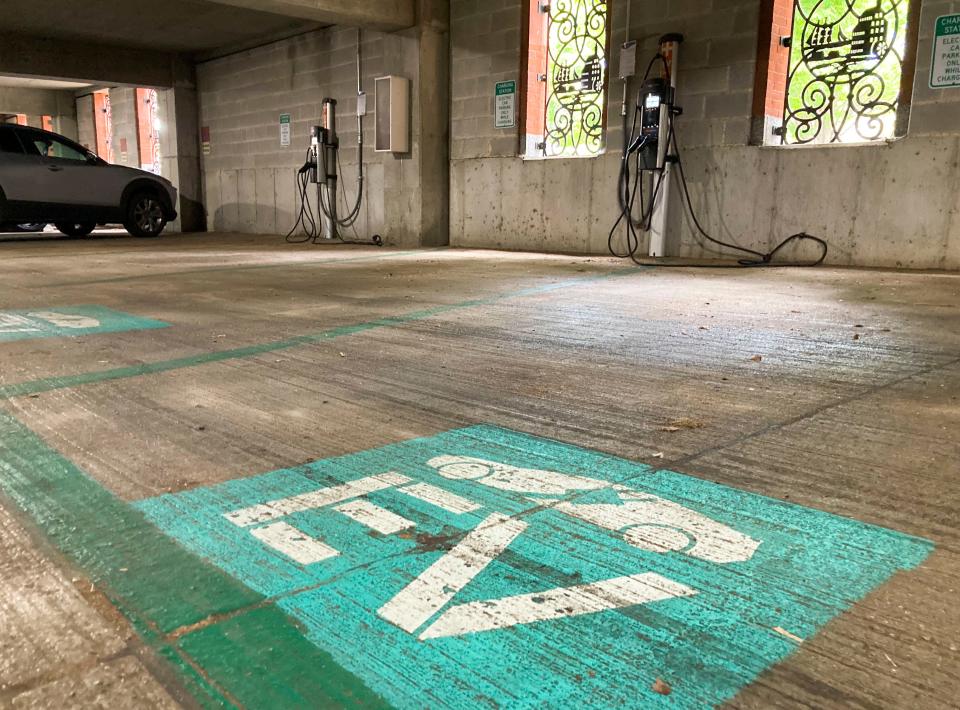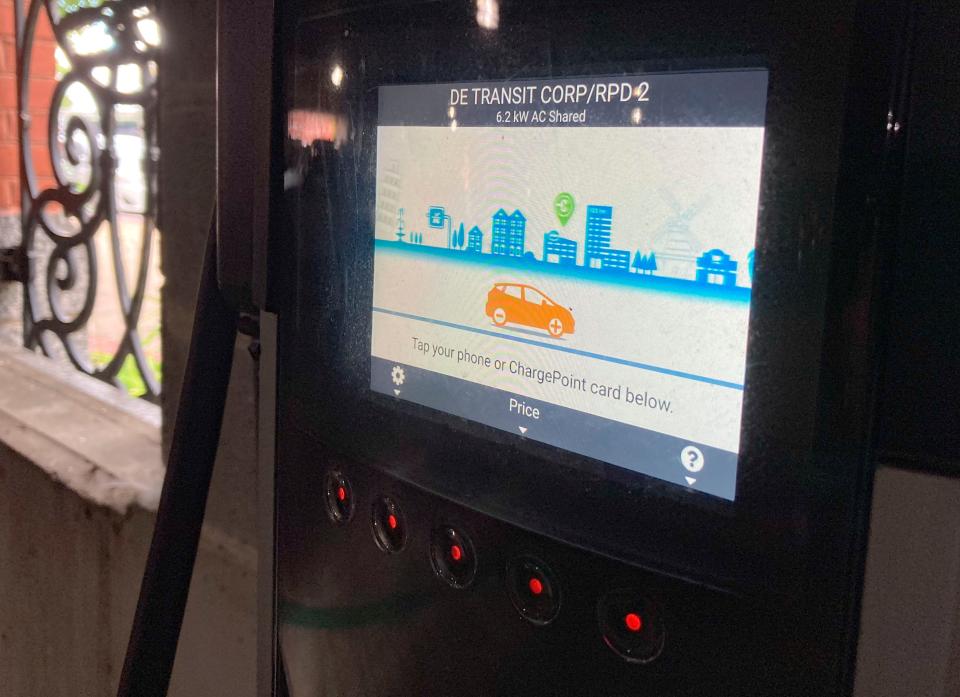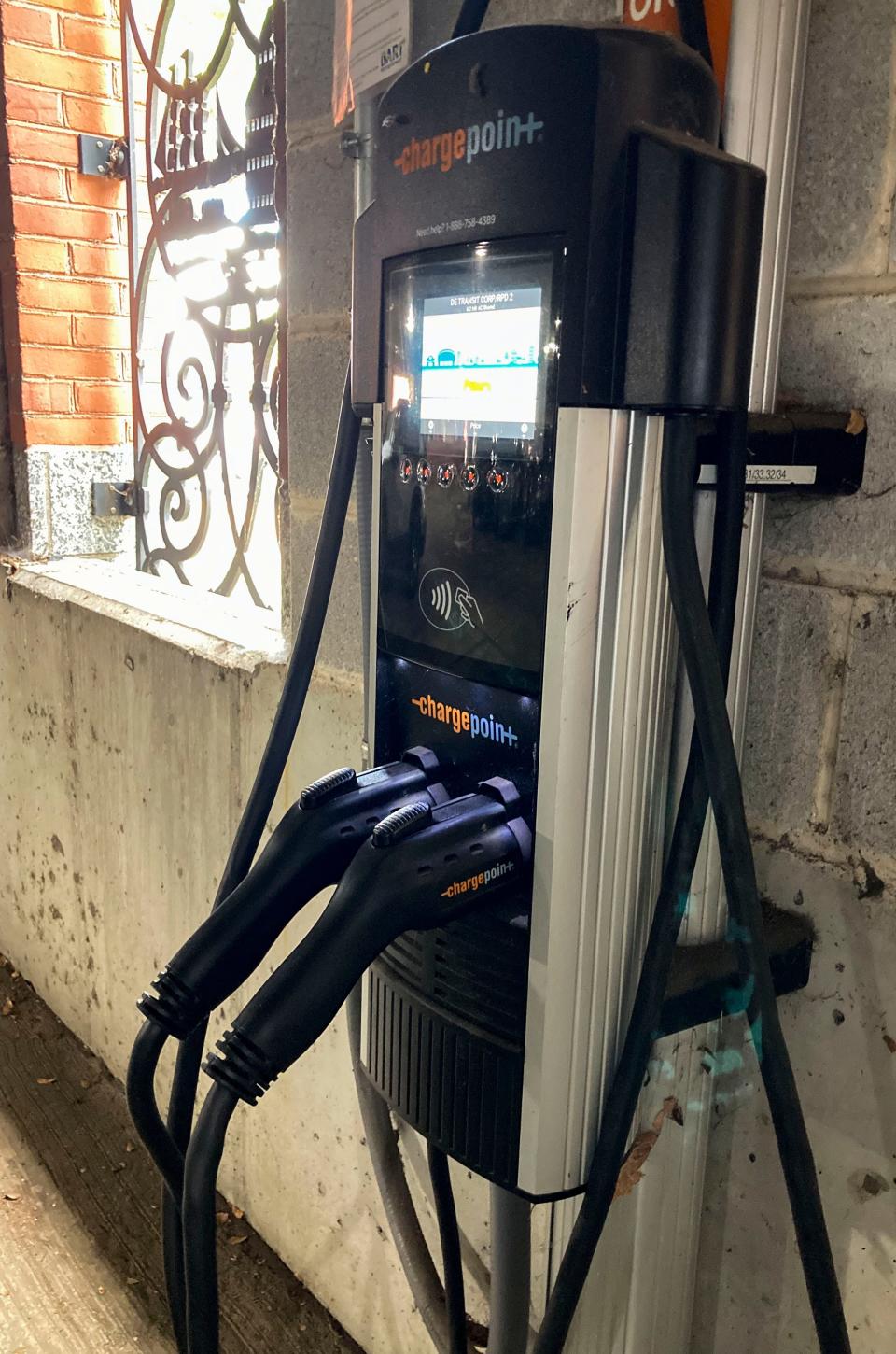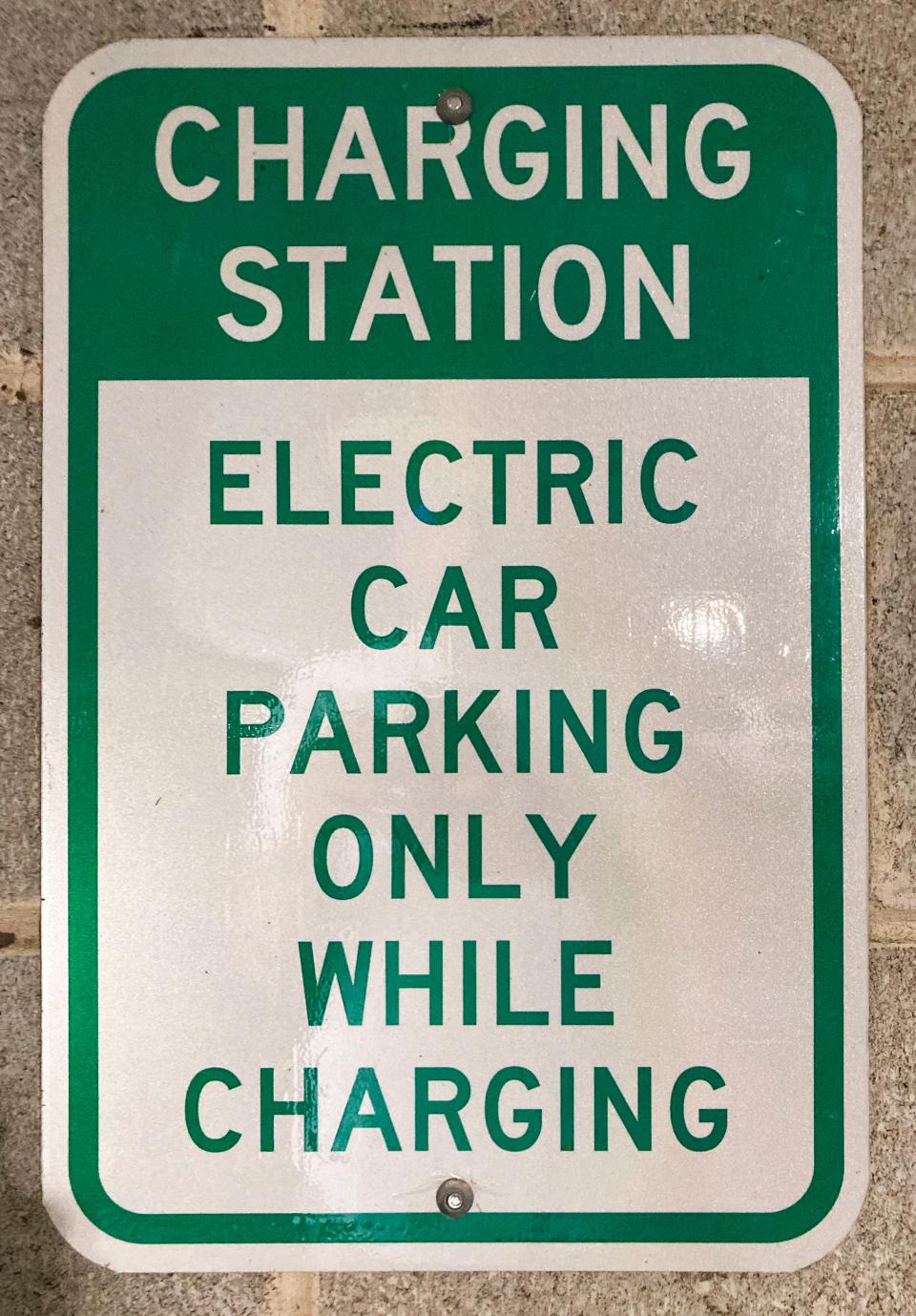Will Delaware have enough charging stations to meet planned electric vehicle mandates
The future of driving could soon look very different in Delaware.
Politicians and analysts are betting that electric vehicles will become the norm in this generation or the next. If California’s clean car standards are enforced in Delaware, all new cars sold in the state must be electric or plug in hybrid by 2035.
But hopes for an EV future may be for naught if there aren’t enough chargers to support the new cars.
Laws are being passed and charging stations are being put in, but whether there will be enough and how long they are going to last are still major questions.
What to know about EV chargers

There are three main types of chargers that differ in their power: AC Level 1, AC Level 2 and DC Fast Chargers.
AC Level 1 chargers are the standard for at-home stations. They plug into a standard 120-volt outlet and charge at a rate of around 3-4 miles of range per hour and can typically fully charge a vehicle overnight.
AC Level 2 are mostly used at home or in corporate parking lots. Depending on the car's battery size and the charging station, Level 2 chargers can be up to 10 times faster than a Level 1 charger. However, it must be connected to a larger socket, which can sometimes rack up a pretty penny to install.
DC Fast Chargers are the chargers that are required to be installed nationwide along busy highways. An average DC Fast charger can provide 80% charge in around 15 minutes.

There are only a handful of companies that actually sell DC Fast Chargers for public use. One of the more well-known companies is Chargepoint, which owns over 100 chargers in Delaware.
Different car manufacturers have their own model of chargers that can be used for their models only. For example, Nissan is the only electric vehicle manufacturer that uses what's called a CHAdeMO connector. However, recently General Motors came to a deal with Tesla that would allow all electric General Motor vehicles to adopt the Tesla charging standard starting in 2025. Ford reached a similar deal with Tesla in late May.
A charging station typically includes a charging cabinet and around five plugs.
Electric vehicle battery life spans vary, but are generally considered to last around 10 years.
Where are Delaware's chargers?
Delaware environmental Secretary Shawn Garvin should soon decide how fast Delaware will move toward mandating electric vehicles. It's expected that all new vehicles sold here must be electric by 2035.
In Delaware, there are currently 25 DC fast charger stations, with 95 individual ports between them and 108 Level 2 stations with 229 ports altogether.
Context: Delaware hopes to phase out sale of new gas-powered cars. What to know about the proposal.
Delaware Natural Resources and Environmental Control received an additional $1.2 million earlier this year from a Volkswagen settlement to install 14 DC Fast charging stations across the state. Five would be in storefronts in New Castle County; four will be set up in Kent County, three of which would be in hotels; and an additional five would be in Sussex County shopping centers.
Rebates are also available for business owners to install Level 2 DC chargers, but not for single-family homes.
President Joe Biden’s administration has set up incentives for states to build out their electric vehicle charging infrastructure.

The National Electric Infrastructure Formula Program provides 80% of all project costs to build out and connect the placement of EV chargers around the state. Delaware’s Department of Transportation received $17.6 million in 2020, to be incrementally supplied over five years, to install chargers.
The Federal Highway Administration also assigned “alternative fuel corridors” to each state where Fast DC Chargers need to be available every 50 miles, and operational 97% of the time. Delaware’s requirements are along I-95, I-295, Route 1, Route 13 and Route 113. If there is money left over from the NEVI fund after these corridors are completed, charging stations can be installed beyond this range.
DelDOT hasn’t installed any of the charging stations yet but is working with third-party businesses like gas stations that would use the money to keep and maintain the chargers. The final list should come out this fall and construction would begin early next year.
In May, Delaware's General Assembly passed legislation that mandates that all new homes have the infrastructure to install the equipment to charge electric vehicles.
The bill would also require that new apartment and condo complexes must put EV charging stations in 5% of the parking spaces, and that another 10% must be EV-capable, to take effect January 2025.
High cost could slow deployment
As of now, many areas around Sussex County and the beaches are considered “charging deserts” by industry experts. Although the state is receiving federal funds and applying for competitive grants, it’s still unknown whether the planned charging stations will be enough.
The cost for equipment and installation of these stations is also up in the air and largely dependent on supply chain factors. According to Pappas, the ballpark number has been anywhere between $600,000 and $800,000 per charging station, but nearby states like Pennsylvania which has already begun deploying stations, are seeing costs closer to $1 million each.
“In theory, we will be able to install 17 charging stations across the state,” Pappas said. “We’re not exactly sure how many we’re going to need.”
Part of DelDOT’s plan was estimating what areas would need more public charging infrastructure once NEVI requirements were met when the alternative fuel corridors were established, most of those areas were between Dover and Millsboro.
Taxing the power grid

Elected officials and stakeholders have also expressed concern about the future demand on the state’s electric grid.
According to Pappas, another one of the federal requirements for the AFCs is that there must be at least four individual ports per charging station, each generating 150 kw of energy.
“That’s a lot of energy to draw from the grid,” Pappas said. “We have been meeting with the electrical utility companies across the state and to this point they have not raised any concerns.”
To try and get ahead of these issues, utility companies like Delmarva and Delaware Electric Company are offering incentives such lower rates or billing credits for customers who charge their vehicle during hours when the grid is being used less.
Supply chain and maintenance challenges
Another major concern is that the electric vehicle charger industry is still in its infancy. Many factors related to maintenance, upkeep and best practices for suppliers are still being worked out.
Chris Malm, director of electrical infrastructure at ABM, said there is no industry-wide standard for operating and maintaining charging stations, especially since there are so many different ones on the market.
In the past three years, he’s overseen around 6,000 repairs across the country, with maintenance costs averaging around $1,100.
There is also a lack of spare parts in the industry right now, meaning supply chain issues could hold up potential maintenance requirements put forth by the NEVI Fund.
“In order to support the electric vehicle mandate, the country needs to treat EV chargers as a mission critical fuel supply,” Malm said. “Until we move to this mindset, the country will never have a sustainable charging network.”
Contact Molly McVety at mmcvety@delawareonline.com. Follow her on Twitter @mollymcvety.
This article originally appeared on Delaware News Journal: Delaware's electric vehicle charging landscape: What needs to change?

